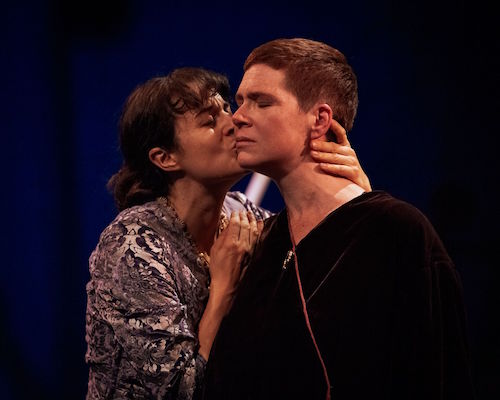 Toronto’s Buddies in Bad Times remounts a play about Gertrude Stein and Alice B. Toklas
Toronto’s Buddies in Bad Times remounts a play about Gertrude Stein and Alice B. Toklas
Gertrude and Alice, Buddies in Bad Times’ remount of Independent Aunties’ 2016 work about the lives of revolutionary writer and bon vivant Gertrude Stein and her “secretary,” Alice B. Toklas, doesn’t feature the traditional biopic structure. After all, as the characters tell us, if we want all of the facts in a timeline, we can simply consult the handsomely-appointed program, one of the most informative and attractive I’ve seen outside of the Shaw Festival, before or after the show. More to the point, Stein says, “what happened is only one part of what is important.”
So, what is important? We start with Stein (Evalyn Parry) welcoming us to the proceedings, part lecture, part party and part peek into the inner workings of Stein and Toklas’ (Anna Chatterton) decades-long working and romantic relationship. In a constant patter of audience acknowledgment, but not participation, she quizzes us as to whether we’ve read her works, and if not, why are we here? Are we interested more in the image of Stein and Toklas than in Stein’s ideas? Why are we much more likely to have read the work of those she mentored – all men – than hers? These questions hang in the air throughout the evening.
Stein’s “three-book minimum” pokes fun at non-readers or those who have read only her most famous work, The Autobiography of Alice B. Toklas, which featured gossip on their influential crowd (including Picasso, Matisse and T.S. Eliot). Though she took to fame quite well, it hadn’t been Stein’s goal; rather, her success was recompense for the woman behind the genius, who stood steadfastly by her beloved “husband” through the long years of rejection and self-publishing.
The relationship is a joy to watch; the women display genuine love and passion for each other, with conflict arising predominantly from the twin flaws of jealousy (Toklas) and egocentrism (Stein). The main story, though, is not their squabbles, but rather how two women understood and appreciated each other in a world that doesn’t properly understand or appreciate them.
Directed by Karin Randola, the two actors are completely comfortable with each other and establish a terrific rapport and rhythm almost immediately. Vocally, Parry fairly nails Stein’s stentorian sing-song cadence that seems in love with itself. Chatterton fits in as many “sh” sounds as possible in her burr as she comes to fierce, almost-unconditional defense of her lover or dispels myths about their lives (particularly about the pot brownies that supposedly fueled many ideas).
A major strength of the show is how it effectively uses complex and intelligent language, both in Parry and Chatterton’s writing and their liberal quotation of Stein’s work. Some of the repetition and loose structure in the latter may strike you as mystifying or compelling, or both. There’s also a playfulness to the discussion of language itself, including Stein’s love for using words of “equal value” and hatred of commas, and an argument over an ex’s name that just happens to be an unavoidable auxiliary verb.
Though Stein is clearly the “talker” of the two from the start, Toklas is never overlooked. She holds her own, reshaping the story with her own comments, winning fights, and convincing us of her ultimate, absolute importance in her domain. That she outlived Gertrude makes her narrative takeover near the end of the play a factual inevitability, but it’s also a symbolic one: there is no story of Stein without Toklas, or vice versa.
The design is another clear star of the show: the costumes (Ming Wong) are sumptuous, the sound (Aleda DeRoche) appropriately retro-futuristic. The set contains a multitude of delightful surprises hidden in and amongst the furniture and hanging Cubist, Calder-like molecular mobiles.
Designer Sherri Hay uses slowly-releasing sand to create elaborate kinetic movement in the structures, which occasionally interacts with the lighting (Michelle Ramsay) in an effervescent shower, and always reminds us of the inexorable passage of time. The focus captured by the design gives weight to Stein’s somewhat irritated claim that we are more likely to be drawn to, and remember, striking visuals rather than complex literature.
Philosophical as the show is, it only teases its darkest moments, particularly when explaining obliquely how the two Jewish women survived the Second World War without leaving Europe by exploiting their fame and connections. True to her character, Toklas reacts practically and emotionally, with a recurring theme showing her distress by the theft of material things that have taken on a greater value. Stein, ironically, escapes in her ideas while at the same time maintaining that art is not an escape.
Art may not be an escape, and the play is not a simple diversion, but it is undeniably diverting. It’s a special experience that rewards, as Stein would say, a slightly different way of seeing.
Details:
- Gertrude and Alice plays until October 7th, 2018 at Buddies in Bad Times Theatre (12 Alexander St.)
- Shows run Tuesday-Saturday at 8:00PM
- Tickets are PWYC – $40 and can be purchased online, in person, or by calling 416-975-8555.
- The show features mature themes, sexual content, and avant-garde literature.
Photo of Anna Chatterton and Evalyn Parry by Jeremy Mimnagh
